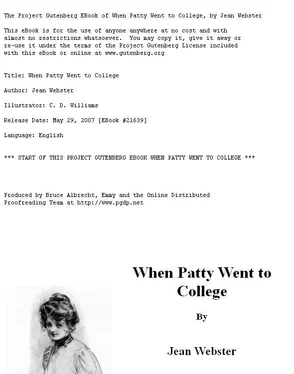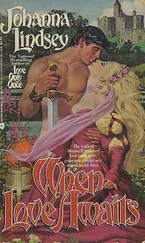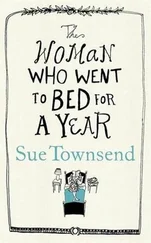Jean Webster - When Patty Went to College
Здесь есть возможность читать онлайн «Jean Webster - When Patty Went to College» весь текст электронной книги совершенно бесплатно (целиком полную версию без сокращений). В некоторых случаях можно слушать аудио, скачать через торрент в формате fb2 и присутствует краткое содержание. Год выпуска: 2007, Жанр: Классическая проза, на английском языке. Описание произведения, (предисловие) а так же отзывы посетителей доступны на портале библиотеки ЛибКат.
- Название:When Patty Went to College
- Автор:
- Жанр:
- Год:2007
- ISBN:нет данных
- Рейтинг книги:4 / 5. Голосов: 1
-
Избранное:Добавить в избранное
- Отзывы:
-
Ваша оценка:
- 80
- 1
- 2
- 3
- 4
- 5
When Patty Went to College: краткое содержание, описание и аннотация
Предлагаем к чтению аннотацию, описание, краткое содержание или предисловие (зависит от того, что написал сам автор книги «When Patty Went to College»). Если вы не нашли необходимую информацию о книге — напишите в комментариях, мы постараемся отыскать её.
When Patty Went to College — читать онлайн бесплатно полную книгу (весь текст) целиком
Ниже представлен текст книги, разбитый по страницам. Система сохранения места последней прочитанной страницы, позволяет с удобством читать онлайн бесплатно книгу «When Patty Went to College», без необходимости каждый раз заново искать на чём Вы остановились. Поставьте закладку, и сможете в любой момент перейти на страницу, на которой закончили чтение.
Интервал:
Закладка:
"And here," she went on, turning to her room-mate's correspondence, "is a cold-cream and a beef-extract letter for Patty, and one from Yale; that's probably Raoul explaining why he couldn't come to the Prom. It won't do any good, though. No mortal man can ever make her believe he didn't have his collar-bone broken on purpose. And I don't know whom that's from," Priscilla continued, examining the last letter. "It's marked 'Hotel A——, New York.' Never heard of it, did you? Never saw the writing before, either."
Georgie laughed. "Do you keep tab on all of Patty's correspondents?"
"Oh, I know the most of them by this time. She usually reads the interesting ones out loud, and the ones that aren't interesting she never answers, so they stop writing. Hurry up; the bell's going to ring"; and they pushed in among the crowd of girls on the steps of the recitation-hall.
The bell did ring just as they reached the class-room, and Priscilla dropped the letters, without comment, into Patty's lap as she went past. Patty was reading poetry and did not look up. She had assimilated some ten pages of Shelley since the first bell rang, and as she was not sure which would be taken up in class, she was now swallowing Wordsworth in the same voracious manner. Patty's method in Romantic Poetry was to be very fresh on the first part of the lesson, catch the instructor's eye early in the hour, make a brilliant recitation, and pass the remainder of the time in gentle meditation.
To-day, however, the unwonted bulk of her correspondence diverted her mind from its immediate duty. She failed to catch the instructor's eye, and the recitation proceeded without her assistance. Priscilla watched her from the back seat as she read the Yale letter with a skeptical frown, and made a grimace over the blue and the yellow; but before she had reached the Hotel A——, Priscilla was paying attention to the recitation again. It was coming her way, and she was anxiously forming an opinion on the essential characteristics of Wordsworth's view of immortality.
Suddenly the room was startled by an audible titter from Patty, who hastily composed her face and assumed a look of vacuous innocence—but too late. She had caught the instructor's eye at last.
"Miss Wyatt, what do you consider the most serious limitations of our author?"
Miss Wyatt blinked once or twice. This question out of its context was not illuminating. It was a part of her philosophy, however, never to flunk flat; she always crawled.
"Well," she began with an air of profound deliberation, "that question might be considered in two ways, either from an artistic or a philosophic standpoint."
This sounded promising, and the instructor smiled encouragingly. "Yes?" she said.
"And yet," continued Patty, after still profounder deliberation, "I think the same reason will be found to be the ultimate explanation of both."
The instructor might have inquired, "Both what?" but she refrained and merely waited.
Patty thought she had done enough, but she plunged on desperately: "In spite of his really deep philosophy we notice a certain—one might almost say dash about his poetry, and a lack of—er—meditation which I should attribute to his immaturity and his a—rather wild life. If he had lived longer I think he might have overcome it in time."
The class looked dazed, and the corners of the instructor's mouth twitched. "It is certainly an interesting point of view, Miss Wyatt, and, as far as I know, entirely original."
As they were crowding out at the end of the recitation Priscilla pounced upon Patty. "What on earth were you saying about Wordsworth's youth and immaturity?" she demanded. "The man lived to be over eighty, and composed a poem with his last gasp."
"Wordsworth? I was talking about Shelley."
"Well, the class wasn't."
"How should I know?" Patty demanded indignantly. "She said 'our author,' and I avoided specific details as long as I could."
"Oh, Patty, Patty! and you said he was wild—the lamblike Wordsworth!"
"What were you laughing at, anyway?" demanded Georgie.
Patty smiled again. "Why, this " she said, unfolding the Hotel A—— letter. "It's from an Englishman, Mr. Todhunter, some one my father discovered last summer and invited out to stay with us for a few days. I'd forgotten all about him, and here he writes to know whether and when he may call, and, if so, will it be convenient for him to come to-night. That's a comprehensive sentence, isn't it? His train gets in at half-past five and he'll be out about six."
"He isn't going to take any chances," said Priscilla.
"No," said Patty; "but I don't mind. I invited him to come out to dinner some night, though I'd forgotten it. He's really very nice, and, in spite of what the funny papers say about Englishmen, quite entertaining."
"Intentionally or unintentionally?" inquired Georgie.
"Both," said Patty.
"What's he doing in America?" asked Priscilla. "Not writing a book on the American Girl, I hope."
"Not quite as bad as that," said Patty. "He's corresponding for a newspaper, though." She smiled dreamily. "He's very curious about college."
"Patty, I hope you were not guilty of trying to make an Englishman, a guest in your father's house, believe any of your absurd fabrications!"
"Of course not," said Patty; "I was most careful in everything I told him. But," she acknowledged, "he—he gets impressions easily."
"It is easy to get impressions when one is talking with you," observed Georgie.
"He asked me," Patty continued, ignoring this remark, "what we studied in college! But I remembered that he was an alien in a foreign land, and I curbed my natural instincts, and outlined the courses in the catalogue verbatim, and I explained the different methods of instruction, and described the library and laboratories and lecture-rooms."
"Was he impressed?" asked Priscilla.
"Yes," said Patty; "I think you might almost say dazed. He asked me apologetically if we ever did anything to relieve the strain,—had any amusements, you know,—and I said, oh, yes; we had a Browning and an Ibsen club, and we sometimes gave Greek tragedies in the original. He was positively afraid to come near me again, for fear I'd forget and talk to him in Greek instead of English."
In view of the facts, Patty's friends considered this last remark distinctly humorous, for she had flunked her freshman Greek three times, and had been advised by the faculty to take it over sophomore year.
"I hope, since he's a newspaper writer," said Priscilla, "that you'll do something to lighten his impression, or he'll never favor women's colleges in England."
"I hadn't thought of that," said Patty; "perhaps I ought."
They had reached the steps of the dormitory. "Let's not go in," said Georgie; "let's go down to Mrs. Muldoon's and get some chocolate cake."
"Thank you," said Priscilla; "I'm in training."
"Soup, then."
"Can't eat between meals."
"You come, then, Patty."
"Sorry, but I've got to take my white dress down to the laundry and have it pressed."
"Are you going to dress up for him to the extent of evening clothes?"
"Yes," said Patty; "I think I owe it to the American Girl."
"Well," sighed Georgie, "I'm hungry, but I suppose I might as well go in and dress that doll for the College Settlement Association. The show's to-night."
"Mine's done," said Priscilla; "and Patty wouldn't take one. Did you see Bonnie Connaught sitting on the back seat in biology this morning, hemming her doll's petticoat straight through the lecture?"
"Really?" laughed Patty. "It's a good thing Professor Hitchcock's near-sighted."
The College Settlement Association, by way of parenthesis, was in the habit of distributing three hundred dolls among the students every year before Christmas, to be dressed and sent to the settlement in New York. The dolls were supposed to be so well dressed that the East Side mothers could use them as models for the clothing of their own children, though it must be confessed that the tendency among the girls was to strive for effect and not for detail. On the evening before the dolls were to be shipped a doll show was regularly held, at which two cents admittance was charged (stamps accepted) to pay the expressage.
Читать дальшеИнтервал:
Закладка:
Похожие книги на «When Patty Went to College»
Представляем Вашему вниманию похожие книги на «When Patty Went to College» списком для выбора. Мы отобрали схожую по названию и смыслу литературу в надежде предоставить читателям больше вариантов отыскать новые, интересные, ещё непрочитанные произведения.
Обсуждение, отзывы о книге «When Patty Went to College» и просто собственные мнения читателей. Оставьте ваши комментарии, напишите, что Вы думаете о произведении, его смысле или главных героях. Укажите что конкретно понравилось, а что нет, и почему Вы так считаете.












